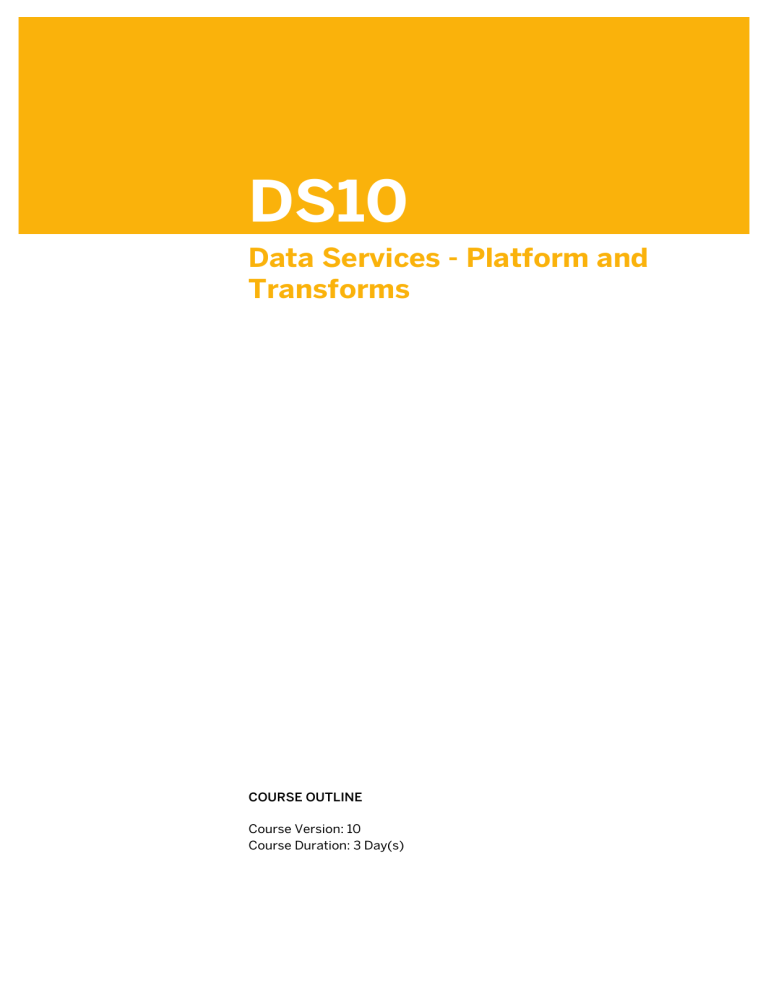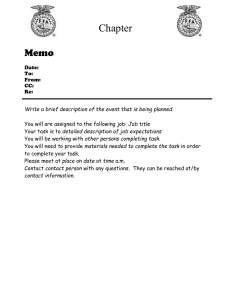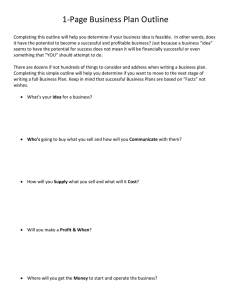
DS10
Data Services - Platform and
Transforms
.
.
COURSE OUTLINE
.
Course Version: 10
Course Duration: 3 Day(s)
SAP Copyrights and Trademarks
© 2015 SAP SE. All rights reserved.
No part of this publication may be reproduced or transmitted in any form or for any purpose
without the express permission of SAP SE. The information contained herein may be
changed without prior notice.
Some software products marketed by SAP SE and its distributors contain proprietary
software components of other software vendors.
●
Microsoft, Windows, Excel, Outlook, and PowerPoint are registered trademarks of
Microsoft Corporation.
●
IBM, DB2, DB2 Universal Database, System i, System i5, System p, System p5, System
x, System z, System z10, System z9, z10, z9, iSeries, pSeries, xSeries, zSeries, eServer,
z/VM, z/OS, i5/OS, S/390, OS/390, OS/400, AS/400, S/390 Parallel Enterprise
Server, PowerVM, Power Architecture, POWER6+, POWER6, POWER5+, POWER5,
POWER, OpenPower, PowerPC, BatchPipes, BladeCenter, System Storage, GPFS,
HACMP, RETAIN, DB2 Connect, RACF, Redbooks, OS/2, Parallel Sysplex, MVS/ESA,
AIX, Intelligent Miner, WebSphere, Netfinity, Tivoli and Informix are trademarks or
registered trademarks of IBM Corporation.
●
Linux is the registered trademark of Linus Torvalds in the U.S. and other countries.
●
Adobe, the Adobe logo, Acrobat, PostScript, and Reader are either trademarks or
registered trademarks of Adobe Systems Incorporated in the United States and/or
other countries.
●
Oracle is a registered trademark of Oracle Corporation
●
UNIX, X/Open, OSF/1, and Motif are registered trademarks of the Open Group.
●
Citrix, ICA, Program Neighborhood, MetaFrame, WinFrame, VideoFrame, and MultiWin
are trademarks or registered trademarks of Citrix Systems, Inc.
●
HTML, XML, XHTML and W3C are trademarks or registered trademarks of W3C®, World
Wide Web Consortium, Massachusetts Institute of Technology.
●
●
Java is a registered trademark of Sun Microsystems, Inc.
JavaScript is a registered trademark of Sun Microsystems, Inc., used under license for
technology invented and implemented by Netscape.
●
SAP, R/3, SAP NetWeaver, Duet, PartnerEdge, ByDesign, SAP BusinessObjects
Explorer, StreamWork, and other SAP products and services mentioned herein as well
as their respective logos are trademarks or registered trademarks of SAP SE in
Germany and other countries.
●
Business Objects and the Business Objects logo, BusinessObjects, Crystal Reports,
Crystal Decisions, Web Intelligence, Xcelsius, and other Business Objects products and
services mentioned herein as well as their respective logos are trademarks or
registered trademarks of Business Objects Software Ltd. Business Objects is an SAP
company.
●
Sybase and Adaptive Server, iAnywhere, Sybase 365, SQL Anywhere, and other Sybase
products and services mentioned herein as well as their respective logos are
trademarks or registered trademarks of Sybase, Inc. Sybase is an SAP company.
All other product and service names mentioned are the trademarks of their respective
companies. Data contained in this document serves informational purposes only. National
product specifications may vary.
These materials are subject to change without notice. These materials are provided by SAP SE
and its affiliated companies ("SAP Group") for informational purposes only, without
representation or warranty of any kind, and SAP Group shall not be liable for errors or
omissions with respect to the materials. The only warranties for SAP Group products and
services are those that are set forth in the express warranty statements accompanying such
products and services, if any. Nothing herein should be construed as constituting an additional
warranty.
© Copyright. All rights reserved.
iii
iv
© Copyright. All rights reserved.
Typographic Conventions
American English is the standard used in this handbook.
The following typographic conventions are also used.
This information is displayed in the instructor’s presentation
Demonstration
Procedure
Warning or Caution
Hint
Related or Additional Information
Facilitated Discussion
User interface control
Example text
Window title
Example text
© Copyright. All rights reserved.
v
vi
© Copyright. All rights reserved.
Contents
ix
Course Overview
1
Unit 1:
1
3
Lesson: Defining Data Services
Unit 2:
3
3
5
Unit 3:
Unit 4:
Unit 5:
Unit 6:
15
15
15
Platform Transforms
Lesson: Using Platform Transforms
Lesson: Using the Map Operation Transform
Lesson: Using the Validation Transform
Lesson: Using the Merge Transform
Lesson: Using the Case Transform
Lesson: Using the SQL Transform
Unit 7:
13
15
Functions, Scripts, and Variables
Lesson: Using Built-In Functions
Lesson: Using Variables, Parameters, and Scripts
11
11
11
11
11
11
13
Batch Job Troubleshooting
Lesson: Writing Comments with Descriptions and Annotations
Lesson: Validating and Tracing Jobs
Lesson: Debugging Data Flows
Lesson: Auditing Data Flows
9
9
11
Batch Job Creation
Lesson: Creating Batch Jobs
7
7
7
7
9
Source and Target Metadata
Lesson: Defining Datastores in Data Services
Lesson: Defining a Data Services Flat File Format
5
7
Data Services
Error Handling
Lesson: Setting Up Error Handling
Unit 8:
Changes in Data
Lesson: Capturing Changes in Data
Lesson: Using Source-Based Change Data Capture (CDC)
Lesson: Using Target-Based Change Data Capture (CDC)
© Copyright. All rights reserved.
vii
17
viii
Unit 9:
Data Services Integrator Transforms
17
17
Lesson: Using Data Services Integrator Transforms
Lesson: Using the Pivot Transform
17
Lesson: Using the Data Transfer Transform
© Copyright. All rights reserved.
Course Overview
TARGET AUDIENCE
This course is intended for the following audiences:
●
Data Consultant/Manager
●
Solution Architect
●
Super / Key / Power User
© Copyright. All rights reserved.
ix
x
© Copyright. All rights reserved.
UNIT 1
Data Services
Lesson 1: Defining Data Services
Lesson Objectives
After completing this lesson, you will be able to:
●
Define Data Services
© Copyright. All rights reserved.
1
Unit 1: Data Services
2
© Copyright. All rights reserved.
UNIT 2
Source and Target Metadata
Lesson 1: Defining Datastores in Data Services
Lesson Objectives
After completing this lesson, you will be able to:
●
Define types of datastores
Lesson 2: Defining a Data Services Flat File Format
Lesson Objectives
After completing this lesson, you will be able to:
●
Define flat file formats
© Copyright. All rights reserved.
3
Unit 2: Source and Target Metadata
4
© Copyright. All rights reserved.
UNIT 3
Batch Job Creation
Lesson 1: Creating Batch Jobs
Lesson Objectives
After completing this lesson, you will be able to:
●
Examine batch jobs
●
Create a basic data flow
© Copyright. All rights reserved.
5
Unit 3: Batch Job Creation
6
© Copyright. All rights reserved.
UNIT 4
Batch Job Troubleshooting
Lesson 1: Writing Comments with Descriptions and Annotations
Lesson Objectives
After completing this lesson, you will be able to:
●
Write comments with descriptions and annotations
Lesson 2: Validating and Tracing Jobs
Lesson Objectives
After completing this lesson, you will be able to:
●
Validate jobs
●
Trace jobs
Lesson 3: Debugging Data Flows
Lesson Objectives
After completing this lesson, you will be able to:
●
Use the interactive debugger
Lesson 4: Auditing Data Flows
Lesson Objectives
After completing this lesson, you will be able to:
●
Audit data flows
© Copyright. All rights reserved.
7
Unit 4: Batch Job Troubleshooting
8
© Copyright. All rights reserved.
UNIT 5
Functions, Scripts, and
Variables
Lesson 1: Using Built-In Functions
Lesson Objectives
After completing this lesson, you will be able to:
●
Use functions in expressions
Lesson 2: Using Variables, Parameters, and Scripts
Lesson Objectives
After completing this lesson, you will be able to:
●
Use variables, parameters, and scripts
© Copyright. All rights reserved.
9
Unit 5: Functions, Scripts, and Variables
10
© Copyright. All rights reserved.
UNIT 6
Platform Transforms
Lesson 1: Using Platform Transforms
Lesson Objectives
After completing this lesson, you will be able to:
●
Describe platform transforms
Lesson 2: Using the Map Operation Transform
Lesson Objectives
After completing this lesson, you will be able to:
●
Use the Map Operation transform in a data flow
Lesson 3: Using the Validation Transform
Lesson Objectives
After completing this lesson, you will be able to:
●
Use the validation transform
Lesson 4: Using the Merge Transform
Lesson Objectives
After completing this lesson, you will be able to:
●
Use the merge transform
Lesson 5: Using the Case Transform
Lesson Objectives
After completing this lesson, you will be able to:
●
Use the case transform
Lesson 6: Using the SQL Transform
Lesson Objectives
© Copyright. All rights reserved.
11
Unit 6: Platform Transforms
After completing this lesson, you will be able to:
●
12
Use the SQL transform
© Copyright. All rights reserved.
UNIT 7
Error Handling
Lesson 1: Setting Up Error Handling
Lesson Objectives
After completing this lesson, you will be able to:
●
Explain the levels of data recovery strategies
© Copyright. All rights reserved.
13
Unit 7: Error Handling
14
© Copyright. All rights reserved.
UNIT 8
Changes in Data
Lesson 1: Capturing Changes in Data
Lesson Objectives
After completing this lesson, you will be able to:
●
Update data which changes slowly over time
Lesson 2: Using Source-Based Change Data Capture (CDC)
Lesson Objectives
After completing this lesson, you will be able to:
●
Use source-based change data capture (CDC)
Lesson 3: Using Target-Based Change Data Capture (CDC)
Lesson Objectives
After completing this lesson, you will be able to:
●
Use target-based CDC
© Copyright. All rights reserved.
15
Unit 8: Changes in Data
16
© Copyright. All rights reserved.
UNIT 9
Data Services Integrator
Transforms
Lesson 1: Using Data Services Integrator Transforms
Lesson Objectives
After completing this lesson, you will be able to:
●
Use the data services integrator transforms
Lesson 2: Using the Pivot Transform
Lesson Objectives
After completing this lesson, you will be able to:
●
Use the pivot transform
Lesson 3: Using the Data Transfer Transform
Lesson Objectives
After completing this lesson, you will be able to:
●
Describe performance optimization
© Copyright. All rights reserved.
17



